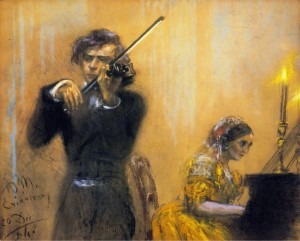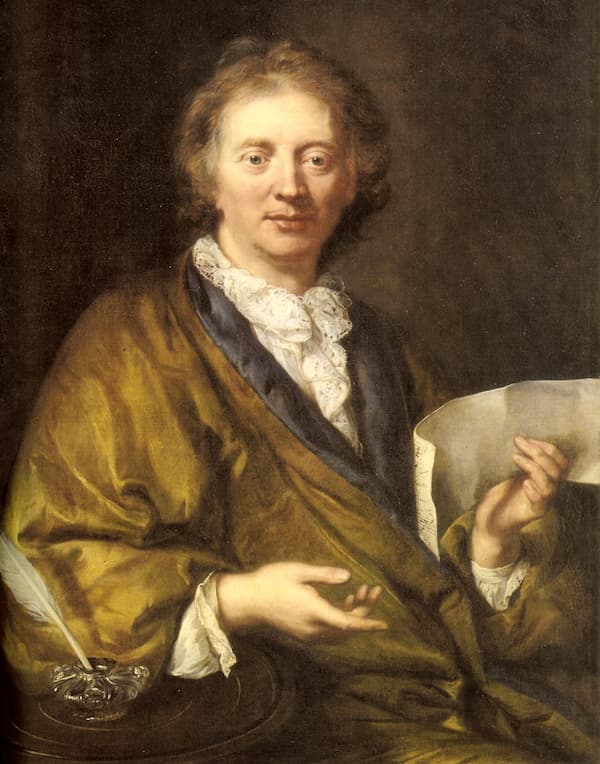 One might reasonably assume that anything written by Robert Schumann for the concerto stage would be played the world over. But that simply is not the case, as onstage performances of his Violin Concerto remain a rarity. So, what actually happened to turn this work by a legacy composer into an unsung concerto? On a cold winter’s day in February 1854, Robert Schumann attempted to commit suicide by jumping into the icy waters of the Rhine River. Although he somehow managed to survive, he was quickly confined to a mental health asylum in the little village of Endenich. Shortly before his attempted suicide, and unbeknownst to the general public, Schumann had feverishly worked to compose a Violin concerto. This concerto, completed in a mere three weeks, was dedicated to his close friend, the violinist Joseph Joachim. However, Joachim was highly critical of this composition and suggested that Schumann’s deteriorating mental health was clearly evident in the sound of this composition. He even went so far as to use phrases like “mental lassitude,” “bewildering passages,” “morbid brooding,” and “tiresome repetitions.” In the end he convinced Clara Schumann and Johannes Brahms, who were editing the first complete edition of Schumann’s music, to suppress it. Together, the three decided that the piece should never be published, and Joachim finally bequeathed the manuscript to the Prussian State Library attaching the stipulation that it should not be looked at until 100 years after the composer’s death. It was not until 1933 that Joachim’s grandniece Jelly d’Aranyi inadvertently found the autograph manuscript. An avid spiritualist, she claimed Joachim had told her about the work during a spiritual visitation. Because of her Jewish heritage, however, she was unable to give the first performance in Germany in 1937. That honor fell on Georg Kulenkampff who premiered the piece with extensive cuts, and with the solo part extensively re-written by Paul Hindemith. The first faithful performance of the Schumann score was given a month later by Yehudi Menuhin, first in a violin and piano reduction, and then with the New York Philharmonic under the baton of Georges Enescu.
One might reasonably assume that anything written by Robert Schumann for the concerto stage would be played the world over. But that simply is not the case, as onstage performances of his Violin Concerto remain a rarity. So, what actually happened to turn this work by a legacy composer into an unsung concerto? On a cold winter’s day in February 1854, Robert Schumann attempted to commit suicide by jumping into the icy waters of the Rhine River. Although he somehow managed to survive, he was quickly confined to a mental health asylum in the little village of Endenich. Shortly before his attempted suicide, and unbeknownst to the general public, Schumann had feverishly worked to compose a Violin concerto. This concerto, completed in a mere three weeks, was dedicated to his close friend, the violinist Joseph Joachim. However, Joachim was highly critical of this composition and suggested that Schumann’s deteriorating mental health was clearly evident in the sound of this composition. He even went so far as to use phrases like “mental lassitude,” “bewildering passages,” “morbid brooding,” and “tiresome repetitions.” In the end he convinced Clara Schumann and Johannes Brahms, who were editing the first complete edition of Schumann’s music, to suppress it. Together, the three decided that the piece should never be published, and Joachim finally bequeathed the manuscript to the Prussian State Library attaching the stipulation that it should not be looked at until 100 years after the composer’s death. It was not until 1933 that Joachim’s grandniece Jelly d’Aranyi inadvertently found the autograph manuscript. An avid spiritualist, she claimed Joachim had told her about the work during a spiritual visitation. Because of her Jewish heritage, however, she was unable to give the first performance in Germany in 1937. That honor fell on Georg Kulenkampff who premiered the piece with extensive cuts, and with the solo part extensively re-written by Paul Hindemith. The first faithful performance of the Schumann score was given a month later by Yehudi Menuhin, first in a violin and piano reduction, and then with the New York Philharmonic under the baton of Georges Enescu.
Robert Schumann: Violin Concerto, WoO 23
You May Also Like
- Unsung Concertos
Joseph Leopold Eybler: Clarinet Concerto (1798) The comparatively late addition of the clarinet family to our modern catalogue of musical instruments at the turn of the 18th century immediately spawned countless generations of woodwind virtuosi. - Unsung Concertos
Nikolaus Kraft: Cello Concerto No. 1 (1815) Antonín Kraft was one of the earliest cello superstars! - Unsung Concertos
Sergei Bortkiewicz: Piano Concerto No. 1, Op. 16 (1913) Sergei Bortkiewicz (1877-1952) described himself as a romantic and a melodist, and he had an emphatic aversion of what he called modern, atonal and cacophonous music. - Unsung Concertos
Moritz Moszkowski (1854-1925): Piano Concerto Op. 3 Critical mass is a concept used in nuclear physics, group dynamics, politics, public opinion, medicine, and technology.
More Anecdotes
-
 The Colours of Love: Couperin’s Dominos The secret language of colors at French royal balls
The Colours of Love: Couperin’s Dominos The secret language of colors at French royal balls - The Devil is a Woman
Eugene Aynsley Goossens and Rosaleen Norton From police raids to passionate letters, learn about the Goossens-Norton scandal - Day and Night with Rachmaninoff
A Close Look at His Symphonic Dances An epic battle between life and death -
 Haydn’s “Ox Minuet” A butcher, his daughter's wedding, and a composer's unexpected reward
Haydn’s “Ox Minuet” A butcher, his daughter's wedding, and a composer's unexpected reward


